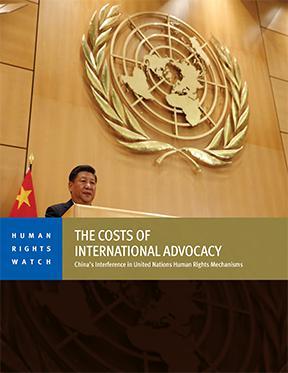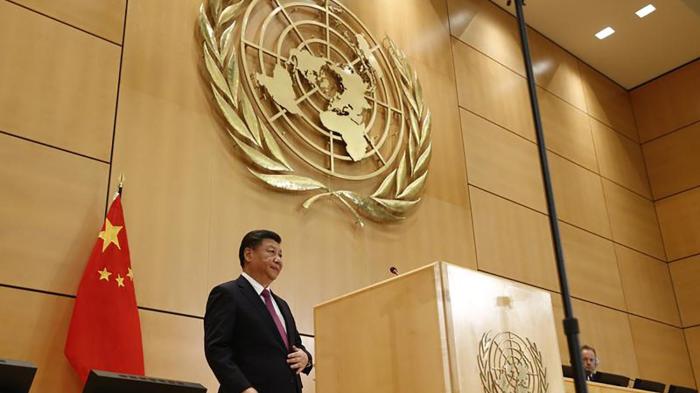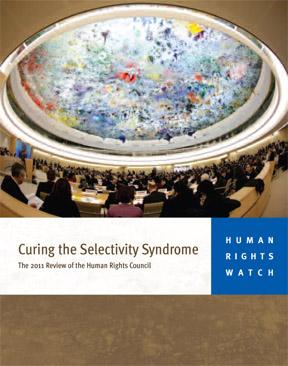Reports
The Costs of International Advocacy
China’s Interference in United Nations Human Rights Mechanisms
This report details China’s efforts to harass independent activists, primarily those from China. Chinese officials have photographed and filmed activists on UN premises in violation of UN rules, and restricted travel by mainland activists to the UN Human Rights Council in Geneva. China has also used its membership on the Economic and Social Council’s Committee on Non-Governmental Organizations (NGOs) to block NGOs critical of China from being granted UN accreditation, and it has sought – and succeeded in – blacklisting accredited activists from participating in UN events.


-
September 22, 2011
Keeping the Momentum
One Year in the Life of the UN Human Rights CouncilThe 69-page report examines the Council's work from July 2010 through June 2011, and describes some notable progress by the Council in its fifth year.
-
June 24, 2010
Curing the Selectivity Syndrome
The 2011 Review of the Human Rights CouncilCuring the Selectivity Syndrome examines the successes and failures of the Human Rights Council to date, and finds significant gaps in the performance of its mandate. Human Rights Watch calls on the Council to engage on all human rights situations that need its attention and to overcome selectivity in its work.
-
September 21, 2009
Pushed Back, Pushed Around
Italy's Forced Return of Boat Migrants and Asylum Seekers, Libya's Mistreatment of Migrants and Asylum SeekersThis 92-page report examines the treatment of migrants, asylum seekers, and refugees in Libya through the eyes of those who have managed to leave and are now in Italy and Malta. It also documents Italy's practice of interdicting boats full of migrants on the high seas and pushing them back to Libya without the required screening.
-
February 12, 2009
"There is No Protection"
Insecurity and Human Rights in Southern SudanThis 44-page report documents the most pressing human rights challenges facing the SPLM-led Government of Southern Sudan. The problems include an inability to protect civilians effectively from armed attacks and violence, a failure to address abuses by security forces, and a weak justice system.

-
December 11, 2008
Killings in Kiwanja
The UN’s Inability to Protect CiviliansThe 30-page report details the killing of an estimated 150 people in the town of Kiwanja on November 4 and 5, 2008 - the worst killing spree in North Kivu province in two years. Although UN peacekeepers considered Kiwanja a priority protection zone, they did not have enough peacekeepers or the capacity to stop the killings.
-
February 14, 2008
A Human Rights Agenda for a New Kosovo
This memorandum identifies seven of the most pressing human rights concerns in Kosovo today. To help identify the key concerns, Human Rights Watch consulted human rights groups across Kosovo’s different ethnic communities -
October 23, 2007
Renewed Crisis in North Kivu
<table cellpadding="3" cellspacing="0"><tr><td><img src="http://www.hrw.org/images/home/2007/100/congo17143.jpg" align="left" border="0" /></td> <td valign="top">This 86-page report details crimes against civilians by Congolese army soldiers, troops of renegade general Laurent Nkunda, and combatants of a Rwandan opposition force called the Forces for the Liberation of Rwanda (FDLR).The report docum</td></tr></table>

-
September 24, 2007
Ten Steps for Darfur
Indicators for Evaluating Progress in the HRC Group of Experts ProcessOn September 24, 2007, the Human Rights Council will consider an interim report by the Group of Experts (GOE) appointed on Darfur. The GOE compiled existing recommendations on Darfur in its June report, and has been working with the government of Sudan to foster their implementation. -
September 10, 2007
Down to Business
The Human Rights Council’s Backlog of WorkAs it enters its second year, the Council must take hold of the many situations that “require the HRC’s attention,” and take action of some sort to address them. The HRC’s efforts to address these situations will provide an important indication of its ability to fulfil the purpose for which it was created. -
May 15, 2007
Belarus’ Pledges: Fiction and Fact
Analysis of Belarus’ Assertions on its Suitability for UN Rights Council MembershipGeneral Assembly resolution 60/251 requires that states “take into account the contribution of candidates to the promotion and protection of human rights and their voluntary pledges and commitments made thereto” in voting to elect members of the Human Rights Council (HRC). -
March 12, 2007
More Business Than Usual: The Work Which Awaits the Human Rights Council
In this first year of its existence, the Council is understandably preoccupied with institution building. But human rights violations haven’t been suspended while the Council focused on these tasks; in fact they have worsened in many locations. The Council’s attention to institution building has created a growing backlog of work that deserves the HRC’s attention. -
November 13, 2006
Key Points for Special Procedures Review
The task of the intergovernmental working group on review of mandates is wide-ranging and important. In this paper, Human Rights Watch identifies the six key points that should help guide the working group's review. -
October 3, 2006
Myths and Reality
An Analysis of the Uzbek Government’s June 30, 2006 Aide-MemoireIn this 16-page briefing paper, Human Rights Watch analyzes an Uzbek government memorandum from June 2006, which was prepared in response to a December 2005 UN General Assembly resolution that was critical of Uzbekistan’s human rights record. -
September 15, 2006
Human Rights Council
New Approaches to Addressing Human Rights SituationsThe new Human Rights Council (“HRC” or “Council”) was created in order to strengthen protection for the victims of human rights violations worldwide. The Council’s ability to succeed in that mission will depend on the development of a more effective approach to consideration of human rights situations in particular countries. -
August 18, 2006
Universal Periodic Review
In May 2006, Human Rights Watch released its initial paper on the functions of the new Human Rights Council (HRC), focusing on universal periodic review (UPR), country situations, and the review of special procedures. In the ensuing months, numerous member states, nongovernmental organizations (NGOs), and leading scholars have offered proposals for how the UPR should be conducted.
